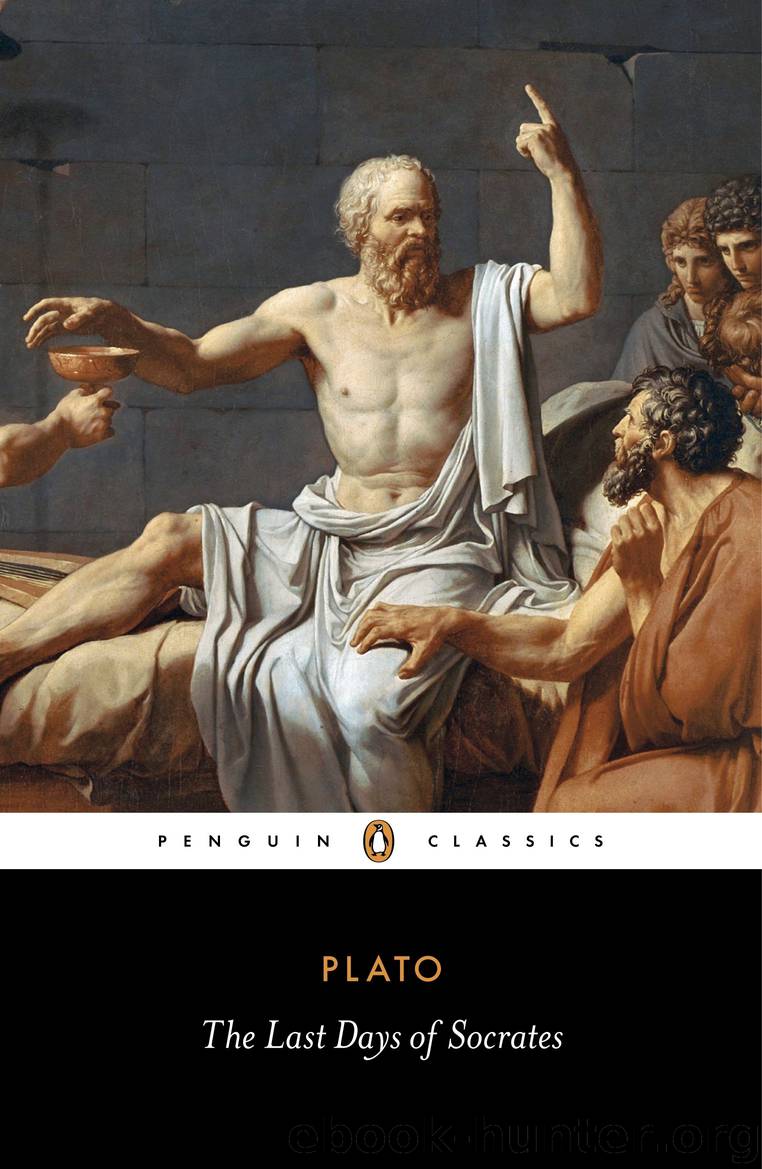The Last Days of Socrates by Plato

Author:Plato
Language: eng
Format: epub
Publisher: Penguin Group USA, Inc.
Published: 2017-12-04T05:00:00+00:00
‘Because I shall cut off mine today, and you ought to do the same,’ said Socrates, ‘that is, if our argument dies and we fail to bring it back to life again. What is more, if I were you, (c) and let the truth escape me, I should make a vow like the Argives113 never to let my hair grow again until I had defeated the argument of Simmias and Cebes in a return battle.’
‘But’, I objected, ‘not even Heracles can take on two at once.’114
‘You had better call upon me to be your Iolaus,’ he said, ‘while the daylight lasts.’115
‘Very well,’ I said, ‘but I am Iolaus appealing to Heracles, not Heracles to Iolaus.’
‘The effect will be just the same,’ he said. ‘But first there is one danger that we must guard against.’
‘What sort of danger?’ I asked.
‘Of becoming “misologic”,’ he said, ‘in the sense that (d) people become misanthropic. No greater misfortune could happen to anyone than that of developing a dislike for argument. “Misology” and misanthropy arise in just the same way. Misanthropy is induced by believing in somebody quite uncritically. You assume that a person is absolutely truthful and sincere and reliable, and a little later you find that he is shoddy and unreliable. Then the same thing happens again. (e) After repeated disappointments at the hands of the very people who might be supposed to be your nearest and most intimate friends, constant irritation finally makes you dislike everybody and suppose that there is no sincerity to be found anywhere. Have you never noticed this happening?’
‘Indeed, I have.’
‘Don’t you feel that it is reprehensible? Isn’t it obvious that such a person is trying to manage human relationships without a basic knowledge of humans? Otherwise he would 90(a) surely recognize the truth: that there are not many very good or very bad people, but the great majority are something between the two.’
‘How do you mean?’ I asked.
‘On the analogy of very large or small objects,’ he said. ‘Can you think of anything more unusual than coming across a very large or small man, or dog, or any other creature? Or one which is very swift or slow, ugly or beautiful, white or black? Have you never realized that extreme instances are few and rare, while intermediate ones are many and plentiful?’
‘Certainly.’
(b) ‘So you think that if there were a competition in wickedness, very few would distinguish themselves even there?’
‘Probably.’
‘Yes, it is probable,’ said Socrates. ‘However, you’ve led me into a digression. The resemblance between arguments and human beings lies not in what I said just now, but in what I said before: that when one believes that an argument is true without possessing skill in logic, and then a little later decides rightly or wrongly that it is false, and the same thing happens (c) again and again – you know how it is, especially with those who spend their time in arguing both sides;116 they end by believing that they are wiser than anyone else,
Download
This site does not store any files on its server. We only index and link to content provided by other sites. Please contact the content providers to delete copyright contents if any and email us, we'll remove relevant links or contents immediately.
| Anthropology | Archaeology |
| Philosophy | Politics & Government |
| Social Sciences | Sociology |
| Women's Studies |
The remains of the day by Kazuo Ishiguro(7587)
Tools of Titans by Timothy Ferriss(6982)
The Black Swan by Nassim Nicholas Taleb(6219)
Inner Engineering: A Yogi's Guide to Joy by Sadhguru(5922)
Giovanni's Room by James Baldwin(5903)
The Way of Zen by Alan W. Watts(5815)
The Six Wives Of Henry VIII (WOMEN IN HISTORY) by Fraser Antonia(4806)
The Power of Now: A Guide to Spiritual Enlightenment by Eckhart Tolle(4780)
Astrophysics for People in a Hurry by Neil DeGrasse Tyson(4634)
Asking the Right Questions: A Guide to Critical Thinking by M. Neil Browne & Stuart M. Keeley(4609)
12 Rules for Life by Jordan B. Peterson(3761)
The Ethical Slut by Janet W. Hardy(3521)
Skin in the Game by Nassim Nicholas Taleb(3489)
Housekeeping by Marilynne Robinson(3427)
The Art of Happiness by The Dalai Lama(3399)
Double Down (Diary of a Wimpy Kid Book 11) by Jeff Kinney(3292)
Skin in the Game: Hidden Asymmetries in Daily Life by Nassim Nicholas Taleb(3280)
Walking by Henry David Thoreau(3242)
12 Rules for Life: An Antidote to Chaos by Jordan B. Peterson(3211)
